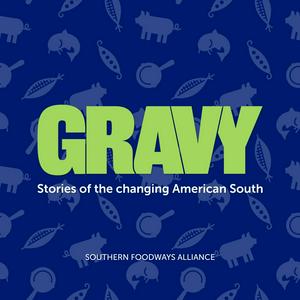The Joyful Black History of the Sweet Potato
In “The Joyful Black History of the Sweet Potato,” Kayla Stewart reports for Gravy on sweet potatoes, which Southern-born Black Americans have baked, roasted, fried, distilled—and long revered. Stewart takes listeners across the United States to learn how African Americans are finding new, interesting ways to enjoy sweet potatoes.
Harvey and Donna Williams own and operate Delta Dirt Distillery in Helena, Arkansas. Both grew up in Arkansas, and Harvey was raised on a farm that has been in his family for generations. His father began growing sweet potatoes to make efficient use of his small acreage, and Williams grew to love the root for its nutritional value. At a conference, he met an entrepreneur distilling sweet potatoes and decided to try it himself. In 2021, Delta Dirt Distillery was born, earning a host of beverage awards. But for the Williams family, success is about more than medals. It’s about recognizing the history and pride associated with sweet potatoes–a history that’s likely made the product even more compelling to Black Americans in the area.
Jeremy Peaches is an agriculture consultant who works at Lucille’s 1913, a non-profit organization operated by Houston chef Chris Williams that aims to combat food insecurity in vulnerable communities. While sweet potatoes are beloved for their sweet, earthy flavor, Peaches says they were also one of the first major sources of economic opportunity for Black American farmers, in part thanks to their resilience during the annual harvest.
Though sweet potatoes can be enjoyed raw, roasted, or distilled, there’s nothing quite like the sweet potato pie. To understand how these pies have been comforting Southerners around the holidays for centuries, Stewart steps into the kitchen with restaurateur and cookbook author Alexander Smalls, who explains the history of sweet potato pie and why Black Americans make such a strong claim to the dish. Finally, Joye B. Moore, owner of Joyebells Desserts and Countrysides, tells of the generational traditions that make her famous sweet potato pies so exceptional.
For this episode, Stewart interviews Harvey Williams, Jeremy Peaches, Alexander Smalls, and Joye B. Moore to learn how this root vegetable nourishes Black entrepreneurs, cooks, and communities—bodies and souls.
Learn more about your ad choices. Visit megaphone.fm/adchoices

